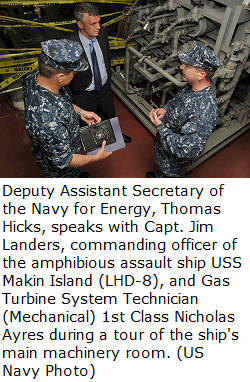 A good friend of mine from my Air Force days alerted me to a story about a U.S. Navy ship that was recently recognized for its hybrid technology during some recent energy awards.
A good friend of mine from my Air Force days alerted me to a story about a U.S. Navy ship that was recently recognized for its hybrid technology during some recent energy awards.
Chris Hatch, who now does Congressional and Public Affairs for the Naval Surface Warfare Center Carderock Division in the Philadelphia, PA area, sent me this release explaining how the USS Makin Island (LHD-8) was recognized by Platts Global Energy Awards as a finalist for Engineering Project of the Year during its 12TH annual ceremony for using hybrid technology. The technology saved between $1.4 million and $2 million in fuel costs, compared to others in her class, during her maiden voyage. And over the expected life of the vessel, that could add up to more than a quarter billion dollars… of our tax dollars:
David Mako, a Naval Ship Systems Engineering Station (NAVSSES) senior electrical engineer, is honored by the prestigious nomination, and takes pride in his and other employees‘ contributions to designing the Amphibious Assault Ship with the Auxiliary Propulsion System (APS) responsible for these fuel savings.
 “We were literally sitting in a room more than ten years ago in Pascagoula, Mississippi with shipbuilders and other stakeholders, sketching layouts and asking ‘what if?'” Mako said. “We had support from the ship‘s Program Manager to think outside the box on this one. He recognized early on that this would be a game changer. He was the real risk taker, and it really paid off.”
“We were literally sitting in a room more than ten years ago in Pascagoula, Mississippi with shipbuilders and other stakeholders, sketching layouts and asking ‘what if?'” Mako said. “We had support from the ship‘s Program Manager to think outside the box on this one. He recognized early on that this would be a game changer. He was the real risk taker, and it really paid off.”
Though Mako half-jokingly bristles at the comparison, APS, also known as Hybrid Electric Drive (HED), is akin to technology used in automobiles. LHD-8 uses a gas turbine engine, and the APS‘ two 5,000hp electric motors for propulsion. APS takes electricity generated for shipboard systems like lighting and heat to turn the propeller for speeds of 12 knots and under, thus avoiding using its 35,000hp gas turbine, which is less efficient at slower speeds.
Chris goes on to explain that the slow speed savings is important as amphibious assault ships spend a great deal of time loitering at low speeds to support deployed troops.
This is just the latest effort by the U.S. Navy to get off the petroleum, especially foreign oil, addiction. In October, Joanna told you about a Navy Riverine Command Boat that runs on algae-based biofuel. The Navy also recently launched a new website to chronicle its environmental efforts, including the use of biofuels and renewable energy at greenfleet.dodlive.mil.

